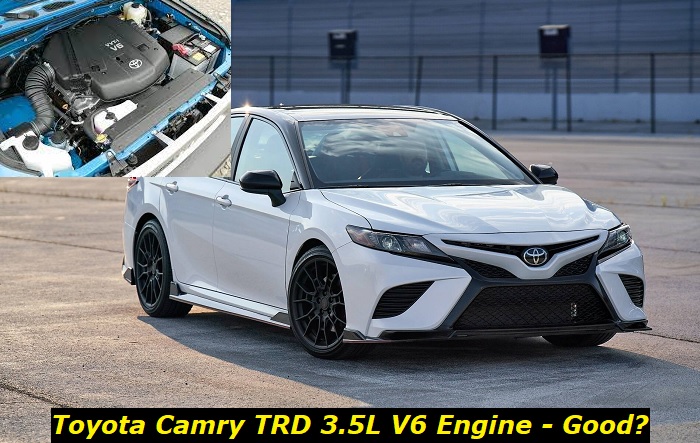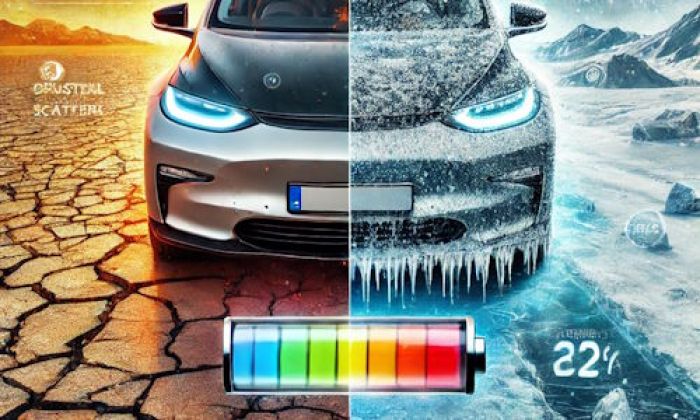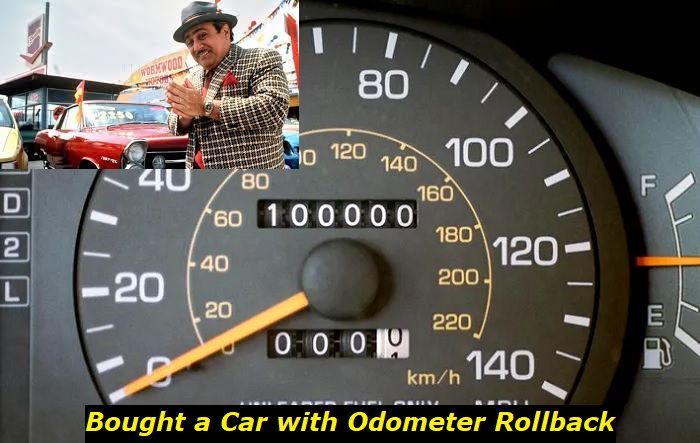The Toyota Camry is one of the most popular sedan cars in America with approximately 300,000 sales every single year! This is amazing and you can see such popularity - just go outside and count the Camrys you can see on the street. In 2023, the XV70 generation of the mid-size sedan is still offered by Toyota. And it has been here since 2017 (obviously needs some refreshments as of now).
Today, we'll tell you about the 3.5L V6 2GR-FKS top-of-the-line engine that powers the most expensive trim of the Toyota Camry called TRD. We'll cover some of the most important features of the engine and see how many miles it can last. Also, we'll consider if you should spend your hard-earned money and buy the TRD Camry instead of paying less and getting the cheaper trim.

Key features and my opinion about the engine
- Production years:2015-now
- Average lifespan of 2GR-FKS:190,000-220,000 miles
- Fuel supply type:combined injection (direct + port)
- Power range:280-315 hp
- Fuel efficiency:average
- Engine block material:aluminum
- Engine reliability score:medium
- The most common problems:oil leaks are common, uneven idling RPM, low-pressure fuel pump problems, water pump issues.
What should you know about the 3.5L V6 engine in the new Camry?
We should warn you that the article is written in mid-2023 and it may not be completely relevant for the upcoming generation of the Camry - we still don't know much about its engines. But we are talking about the 3.5L V6 powerplant option today because this is basically one of the last clear V6 non-turbo engines in such vehicles. Ecology rules get stricter and all manufacturers have to switch to small-displacement turbo engines or hybrids instead.
So, the 3.5L V6 powers the TRD trim level that starts almost at $35,000 now. The cheaper trims come with the 2.5L 4-cylinder engine or with the hybrid powerplant. The V6 is pretty interesting for those who love the power and cool sound of the engine and don't care about fuel consumption much. This engine option also looks more reliable than other ones, but let's talk about that later.
Here are some key facts about the 3.5L V6 engine in the Camry:
- this is the 2GR-FKS engine with 3.5L of displacement, 6 cylinders, 301 horsepower, and 267 lb-ft of torque;
- the engine was first introduced in 2015 and has been used in a lot of Toyota and Lexus models with numerous modifications;
- the engine is mated to the 8-speed automatic transmission codenamed UA80E engineered by Toyota - pretty good and durable transmission;
- the engine is non-turbo, but it's not a simple powerplant, it can work in the Atkinson cycle on demand, has direct fuel injection, and offers a lot of modern technologies for the economy;
- the engine uses VVT-iW and VVT-i systems to time the valve position properly;
- the timing system is powered by the chain - this one will need to be changed at least every 100K miles to avoid issues;
- the engine head and block are made of aluminum, repairing the high-mileage 2GR-FKS proves to be impossible or too expensive;
- the engine offers 22 MPG in the city and 31 MPG on highways which is not too great but OK for a V6 on a mid-size car.
Now you know all the key features of the 2GR-FKS engine that powers the TRD trim level in the new Camry. This is not a bad powerplant which seems to be reliable and easy to maintain. But it still has some issues and car owners report a lot of them.
In terms of how it goes, we can only say compliments. This version of the Camry will take you to 60 mph from a complete stop for 5.5 seconds. At least, this is what Toyota claims in tech specs. Also, the engine proves to be more economical than other V6 options from different car brands.
How many miles will the Camry V6 engine survive?
In terms of reliability, this engine is really good. It will go at least 240,000 miles without serious issues. The engine just doesn't have any modules that can let you down and cause expensive breakdowns. But it doesn't mean that you will forget where the Toyota dealer is located in your city.
First of all, the automatic transmission will not go that much without problems. Although it's a simple transmission that you can repair, you will need to spend money on it. Approximately at 150,000 miles, the transmission will need overhauling or replacement. But with the new transmission or after a good repair, the vehicle can go another 150K miles.
Also, some minor issues will obviously spoil your mood now and then. They will not affect the overall life expectancy of the V6 engine in your Camry but they will take some money out of your pocket or at least make you spend some time in the dealership.
But overall, this is a durable and arguable problem-free engine that can go a lot of miles.
What are the common problems with the Toyota Camry V6 engine?
Although this is a really reliable engine with not many common issues, we've found some reports and categorized them to understand potential weak links in the powerplant. The 2GR-FKS engine may not develop these issues and go with no problems until it reaches 220-240 miles. But most likely, you will need to go to the dealer one or two times a year to have some minor repairs.
Here are the most common reasons why this may happen:
1. Oil leaks
The VVT-i system and the traditional problem of timing cover leaks will make you worry from time to time. Mostly, you will need to have a seal or a gasket replaced, but sometimes things may go worse.
For example. leaking VVT-i will need more complicated repairs. Also, high-mileage engines will develop more tricky leaks that are harder to locate and get rid of. So, yes, like pretty much all Toyota engines, this one shares some oil with the environment, too.
2. Poor idling
Sometimes, you may notice that the engine shows unstable RPM when idling. This problem may worry you because of the vapor canister purge valve (solenoid) issues. They are pretty common with this engine but fortunately not that hard and expensive to fix.
Though, poor idling may also be a sign of other problems, so a good diagnosis is needed anyway.
3. Low-pressure fuel pump issues
There was a recall for earlier years of this engine that aimed to replace the faulty low-pressure fuel pump. But we found several reports in fresh engines, so we believe Toyota hasn't solved the issue.
This engine has combined fuel consumption to help it avoid carbon buildup. The low-pressure fuel pump works constantly and if it fails, your engine will not start and move. So, this problem can paralyze your vehicle and cause some discomfort.
4. Timing and water pump issues
While the timing system is more or less OK, it will still need the timing chain replacement sooner than Toyota recommends. We believe, 80-100 thousand miles is a good time to replace the belt along with the pump and tensioner. Otherwise, the belt may stretch and make unpleasant sounds and the pump may fail and affect the cooling system of the engine.
Unfortunately, chain replacement for this V6 Toyota engine is not cheap at all.
5. Coil pack problems
One more issue that can reduce the amount of money in your pocket is the coil problem. The ignition coil may go as long as 100K miles or as short as 10K miles just failing randomly and requiring replacement. You can still drive the vehicle when one or two coils fail, but you will get very low power and huge fuel consumption. Also, driving your Camry with a failed coil for a long time may have other consequences for the engine.
How can you prolong the life of the V6 engine in your Camry?
This is a durable and high-quality engine. But even the bulletproof 2GR-FKS powerplant won't live a long and happy life without proper maintenance. So, changing oil and filters regularly is the first golden rule for any Camry owner with the V6 engine under the hood.
Also, you should remember about the timing chain kit replacement at least every 100,000 miles or better sooner than that. This will save you from bad failures of the overheated engine when the pump breaks and also help you avoid timing chain issues.
You can rev up the engine quite hard but driving at high revs for a long time is not recommended. The engine may overheat and wear badly.
Make sure you address all the minor issues that happen with this engine immediately. Driving the 2GR-FKS V6 engine with a failed coil or poorly working VVT-i valve is not a good idea. If the minor problem isn't repaired on time, the Camry V6 engine may get into trouble and take a lot more money from your pocket.
About the authors
The CarAraC research team is composed of seasoned auto mechanics and automotive industry professionals, including individuals with advanced degrees and certifications in their field. Our team members boast prestigious credentials, reflecting their extensive knowledge and skills. These qualifications include: IMI: Institute of the Motor Industry, ASE-Certified Master Automobile Technicians; Coventry University, Graduate of MA in Automotive Journalism; Politecnico di Torino, Italy, MS Automotive Engineering; Ss. Cyril and Methodius University in Skopje, Mechanical University in Skopje; TOC Automotive College; DHA Suffa University, Department of Mechanical Engineering






Add comment